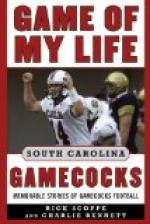The victims were to take the cars at a station called Clarkson turnout, which was about four miles from master’s place. The excitement was so great that the overseer and driver could not control the relatives and friends of those that were going away, as a large crowd of both old and young went down to the depot to see them off. Louisiana was considered by the slaves a place of slaughter, so those who were going did not expect to see their friends again. While passing along many of the negroes left their masters’ fields and joined us as we marched to the cars; some were yelling and wringing their hands, while others were singing little hymns that they had been accustomed to for the consolation of those that were going away, such as
“When we all meet in
heaven,
There is no parting
there;
When we all meet in heaven,
There is parting
no more.”
We arrived at the depot and had to wait for the cars to bring the others from the Sumterville jail, but they soon came in sight, and when the noise of the cars had died away, we heard wailing and shrieks from those in the cars. While some were weeping, others were fiddling, picking banjo, and dancing as they used to do in their cabins on the plantations. Those who were so merry had very bad masters, and even though they stood a chance of being sold to one as bad or even worse, yet they were glad to be rid of the one they knew.
While the cars were at the depot a large crowd of white people gathered, laughing and talking about the prospect of negro traffic; but when the cars began to start, and the conductor cried out, “All who are going on this train must get on board without delay,” the colored people cried out with one voice as though the heavens and earth were coming together, and it was so pitiful that those hard-hearted white men, who had been accustomed to driving slaves all their lives, shed tears like children. As the cars moved away we heard the weeping and wailing from the slaves as far as human voice could be heard; and from that time to the present I have neither seen nor heard from my two sisters, nor any of those who left Clarkson depot on that memorable day.
THE WAY THE SLAVES LIVED.
Most of the cabins in the time of slavery were built so as to contain two families; some had partitions, while others had none. When there were no partitions each family would fit up its own part as it could; sometimes they got old boards and nailed them up, stuffing the cracks with rags; when they could not get boards they hung up old clothes. When the family increased the children all slept together, both boys and girls, until one got married; then a part of another cabin was assigned to that one, but the rest would have to remain with their mother and father, as in childhood, unless they could get with some of their relatives or friends who had small families, or unless they were




